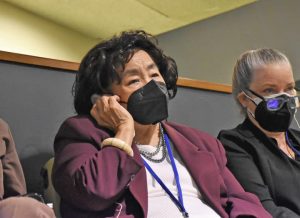NPT Review Conference 2022: Japanese Prime Minister’s speech at UN has no mention of TPNW, failing to convince listeners of his determination for nuclear elimination
Aug. 3, 2022
A-bomb survivors appreciate his attendance but show dissatisfaction toward his speech
Regarding the speech delivered by Japanese Prime Minister Fumio Kishida at the Nuclear Non-Proliferation Treaty (NPT) review conference held at United Nations (UN) headquarters on August 1, A-bomb survivors (hibakusha) and members of peace organizations increased their dissatisfaction because Mr. Kishida made no mention of the tragedy of the atomic bombing or the Treaty on Prohibitions of the Nuclear Weapons (TPNW) in the speech.
In seats for public observers at the UN headquarters’ assembly hall, there were people related to Hiroshima who came all the way from different parts of the world. One of them was Setsuko Thurlow, 90, an A-bomb survivor living in Canada who is distantly related to Mr. Kishida. She held a press conference after listening to his speech, and made a critical comment, saying, “His words sounded good, but I couldn’t tell how much he was thinking about the A-bombed survivors.” Expressing skepticism over him not mentioning the TPNW, Ms. Thurlow uttered harsh words, saying “With the current policy following the U.S., the world which the prime minister is looking for would never come.”
Kunihiko Sakuma, 77, chair of the Hiroshima Prefectural Confederation of A-bomb Sufferers Organizations (Hiroshima Hidankyo) lamented that Mr. Kishida didn’t use the word “hibakusha.” As Mr. Sakuma has visited the U.S. in accordance with the review conference and kept on sharing his experience of the atomic bombing, he said, “The prime minister hasn’t understood our feelings. I couldn’t be convinced he was moving towards elimination of nuclear weapons through his speech.”
Yuta Takahashi, 21, who is originally from Fukuyama and serves as co-chair of Know Nukes Tokyo, a group of young people working to abolish nuclear weapons, attended the speech, too. Showing his disappointment, Mr. Takahashi said, “I wanted Mr. Kishida to stress the humanitarian impacts of nuclear weapons more and make an appeal for solidarity of the international community to realize a world without nuclear weapons.”
Mr. Kishida’s speech was delivered very early in the morning Japan time on August 2. In Hiroshima, other A-bomb survivors also followed the prime minister’s words and deeds. “I think his presence as the prime minister who was elected in the A-bombed city was good,” said Toshiyuki Mimaki, 80, co-chairperson of the Japan Confederation of A- and H-Bomb Sufferers’ Organizations (Nihon Hidankyo). Mr. Mimaki emphatically continued, “The Japanese government has stressed it would play a role bridging nuclear nations and non-nuclear nations. The world is currently paying attention to whether Japan can do it with action.”
In the prime minister’s 11-minute speech, some positive ideas were proposed such as the establishment of a UN foundation to encourage young people throughout the world to visit the A-bombed cities, too. Mayu Seto, 31, member of a group called Kakuwaka Hiroshima, which is mainly composed of young people in Hiroshima who are actively learning about nuclear policies as voters, shared her expectations for the proposal, saying “I’m looking forward to a visit based on the UN foundation. I hope such a visit would include items providing visitors with the chance to learn with local people and think about what they can do specifically for the elimination of nuclear weapons.”
(Originally published on August 3, 2022)








